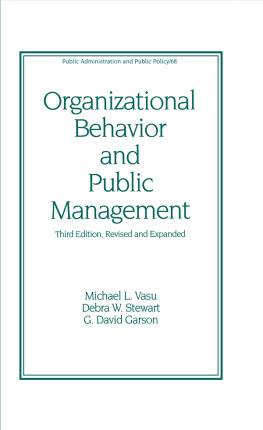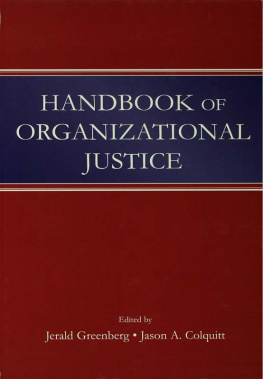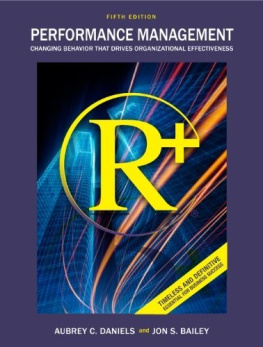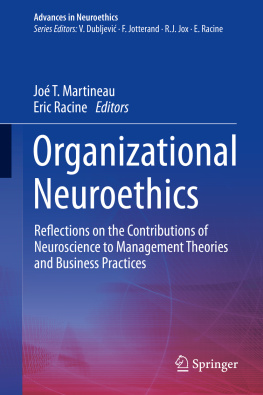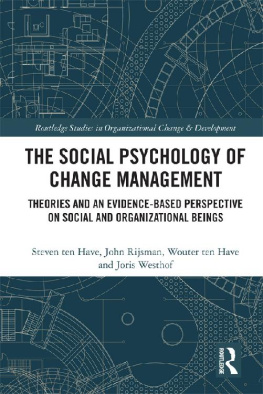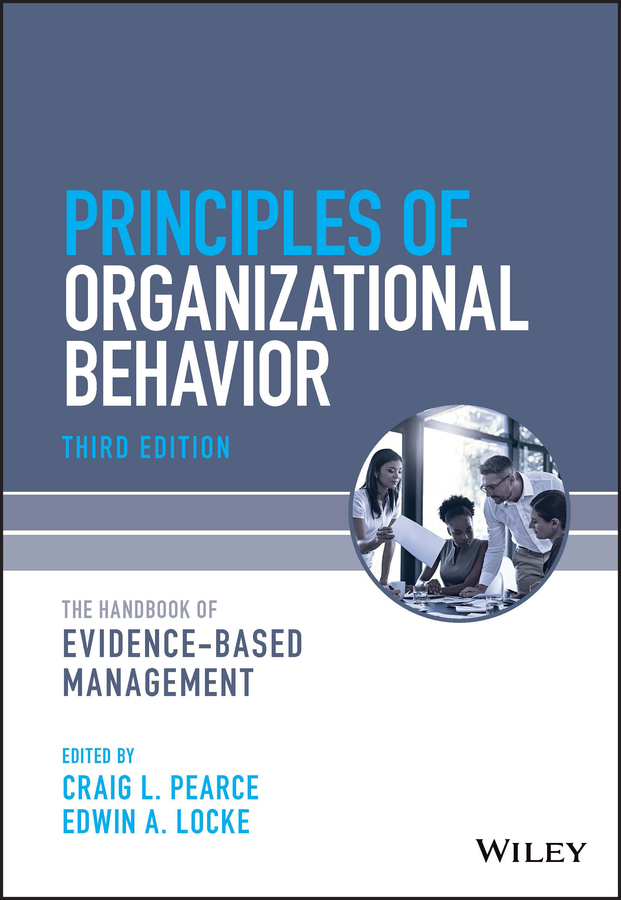
Table of Contents
List of Tables
- Chapter 6
- Chapter 8
- Chapter 9
- Chapter 12
- Chapter 14
- Chapter 18
- Chapter 21
- Chapter 28
List of Illustrations
- Chapter 5
- Chapter 6
- Chapter 8
- Chapter 9
- Chapter 12
- Chapter 13
- Chapter 14
- Chapter 18
- Chapter 19
- Chapter 21
- Chapter 23
- Chapter 25
- Chapter 28
- Chapter 29
Guide
Pages
PRINCIPLES OF ORGANIZATIONAL BEHAVIOR
THE HANDBOOK OF EVIDENCE-BASED MANAGEMENT
THIRD EDITION
CRAIG L. PEARCE
EDWIN A. LOCKE

This edition first published 2023
2023 Craig L. Pearce and Edwin A. Locke
Edition History
All rights reserved. No part of this publication may be reproduced, stored in a retrieval system, or transmitted, in any form or by any means, electronic, mechanical, photocopying, recording or otherwise, except as permitted by law. Advice on how to obtain permission to reuse material from this title is available at http://www.wiley.com/go/permissions.
The right of Craig L. Pearce and Edwin A. Locke to be identified as the authors of the editorial material in this work has been asserted in accordance with law.
Registered Offices
John Wiley & Sons, Inc., 111 River Street, Hoboken, NJ 07030, USA
John Wiley & Sons Ltd., The Atrium, Southern Gate, Chichester, West Sussex, PO19 8SQ, UK
Editorial Office
The Atrium, Southern Gate, Chichester, West Sussex, PO19 8SQ, UK
For details of our global editorial offices, customer services, and more information about Wiley products, visit us at www.wiley.com.
Wiley also publishes its books in a variety of electronic formats and by print-on-demand. Some content that appears in standard print versions of this book may not be available in other formats.
Trademarks: Wiley and the Wiley logo are trademarks or registered trademarks of John Wiley & Sons, Inc. and/or its affiliates in the United States and other countries and may not be used without written permission. All other trademarks are the property of their respective owners. John Wiley & Sons, Inc. is not associated with any product or vendor mentioned in this book.
Limit of Liability/Disclaimer of Warranty
While the publisher and authors have used their best efforts in preparing this work, they make no representations or warranties with respect to the accuracy or completeness of the contents of this work and specifically disclaim all warranties, including without limitation any implied warranties of merchantability or fitness for a particular purpose. No warranty may be created or extended by sales representatives, written sales materials, or promotional statements for this work. The fact that an organization, website, or product is referred to in this work as a citation and/or potential source of further information does not mean that the publisher and authors endorse the information or services the organization, website, or product may provide or recommendations it may make. This work is sold with the understanding that the publisher is not engaged in rendering professional services. The advice and strategies contained herein may not be suitable for your situation. You should consult with a specialist where appropriate. Further, readers should be aware that websites listed in this work may have changed or disappeared between when this work was written and when it is read. Neither the publisher nor authors shall be liable for any loss of profit or any other commercial damages, including but not limited to special, incidental, consequential, or other damages.
Library of Congress Cataloging-in-Publication Data
Names: Locke, Edwin A., editor. | Pearce, Craig L., editor. | John Wiley & Sons, publisher.
Title: Principles of organizational behavior : the handbook of evidence-based management / Edwin A. Locke, Craig L. Pearce.
Description: 3rd edition. | Hoboken, NJ : Wiley, 2023. | Includes index.
Identifiers: LCCN 2022056231 (print) | LCCN 2022056232 (ebook) | ISBN 9781119828549 (paperback) | ISBN 9781119828617 (adobe pdf) | ISBN 9781119828600 (epub)
Subjects: LCSH: Organizational behavior.
Classification: LCC HD58.7 .P7423 2023 (print) | LCC HD58.7 (ebook) | DDC 658dc23/eng/20230221
LC record available at https://lccn.loc.gov/2022056231
LC ebook record available at https://lccn.loc.gov/2022056232
Cover Design: Wiley
Cover Image: Peopleimages/Getty Images
Preface
Our goal with this book was to bring together comprehensive, science-based, actionable advice, from the world's leading experts, for managing organizations. We deliver on this goal.
There are 29 chapters in this book, each dedicated to a specific management challenge. The chapters are written by the foremost thinkers on the topics. The authors hone in on the key principle for their respective topics the key piece of advice for turning knowledge into action. All of their advice is solidly based upon science. In other words, you can have confidence in their advice.
Our book is in stark contrast to normal textbooks, which provide endless lists of factoids to memorize about topics. Such books are of little value if the reader desires to apply the information to real-world situations. It is difficult to glean from such lists exactly what one should implement in this book, we prioritize knowledge into overarching principles, which facilitates the implementation of concrete actions in real-world situations.
Books in the popular press, on the other hand, generally offer pithy advice from self-declared experts, but these books generally have little to no basis in science. These types of books are typically easy to read and do attempt to provide ideas to put into action. Nonetheless, the advice provided is largely overly specific to the author's experience and thus lacks transferability to the circumstances of the reader. As such, while these types of books are generally engaging, they are best regarded as nonfiction stories, with limited practical value.
Our book is different. It combines science and action. The range of subjects is expansive, encompassing 29 areas ranging from selection, to motivation, to leadership, and all topics in between. In the section on selection, for instance, there are chapters on how to select based on intelligence (In-Sue Oh and Frank Schmidt), how to select based on personality (Murray Barrick and Michael Mount), and the proper use of interviews (Cynthia Stevens). In the section on motivation, there are chapters on how to manage emotions (Edwin Locke), how to implement goal setting (Gary Latham), how to cultivate self-efficacy (Albert Bandura), how to pay for performance (Kathryn Bartol), and how to enhance satisfaction (Timothy Judge, Ryan Klinger, and Meng Li).
In the section on the development of employees, there are chapters on the science of training and development (Eduardo Salas and Kevin Stagl), how to use performance appraisals (Maria Rotundo and Kelly Murumets), how to use employee participation (John Wagner), how to use recognition (Jean Phillips, Kathryn Dlugos, and Hee Man Park), and how to foster continuous learning (Michael Beer). In the section on leadership, there are chapters on how to empower effectively (Jay Conger and Craig Pearce), the proper use of power and influence (Gary Yukl), how to create unifying vision (David Waldman), and how to foster trust (Jason Colquitt and Michael Baer).
Next page

